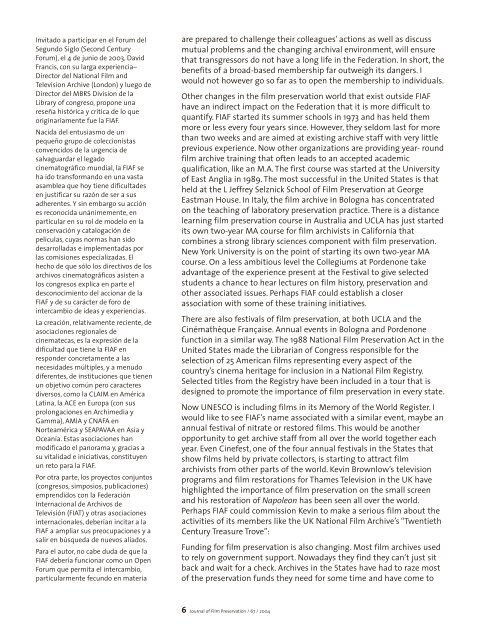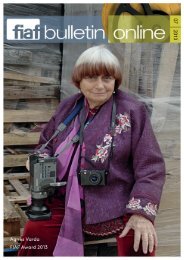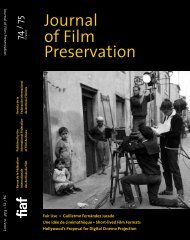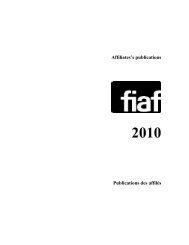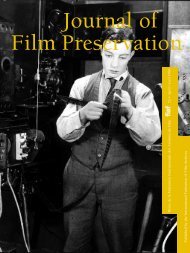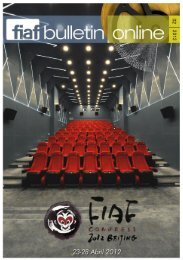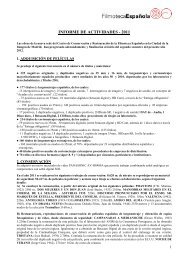Journal of Film Preservation - FIAF
Journal of Film Preservation - FIAF
Journal of Film Preservation - FIAF
You also want an ePaper? Increase the reach of your titles
YUMPU automatically turns print PDFs into web optimized ePapers that Google loves.
Invitado a participar en el Forum del<br />
Segundo Siglo (Second Century<br />
Forum), el 4 de junio de 2003, David<br />
Francis, con su larga experiencia–<br />
Director del National <strong>Film</strong> and<br />
Television Archive (London) y luego de<br />
Director del MBRS Division de la<br />
Library <strong>of</strong> congreso, propone una<br />
reseña histórica y crítica de lo que<br />
originariamente fue la <strong>FIAF</strong>.<br />
Nacida del entusiasmo de un<br />
pequeño grupo de coleccionistas<br />
convencidos de la urgencia de<br />
salvaguardar el legado<br />
cinematográfico mundial, la <strong>FIAF</strong> se<br />
ha ido transformando en una vasta<br />
asamblea que hoy tiene dificultades<br />
en justificar su razón de ser a sus<br />
adherentes. Y sin embargo su acción<br />
es reconocida unánimemente, en<br />
particular en su rol de modelo en la<br />
conservación y catalogación de<br />
películas, cuyas normas han sido<br />
desarrolladas e implementadas por<br />
las comisiones especializadas. El<br />
hecho de que sólo los directivos de los<br />
archivos cinematográficos asisten a<br />
los congresos explica en parte el<br />
desconocimiento del accionar de la<br />
<strong>FIAF</strong> y de su carácter de foro de<br />
intercambio de ideas y experiencias.<br />
La creación, relativamente reciente, de<br />
asociaciones regionales de<br />
cinematecas, es la expresión de la<br />
dificultad que tiene la <strong>FIAF</strong> en<br />
responder concretamente a las<br />
necesidades múltiples, y a menudo<br />
diferentes, de instituciones que tienen<br />
un objetivo común pero caracteres<br />
diversos, como la CLAIM en América<br />
Latina, la ACE en Europa (con sus<br />
prolongaciones en Archimedia y<br />
Gamma), AMIA y CNAFA en<br />
Norteamérica y SEAPAVAA en Asia y<br />
Oceanía. Estas asociaciones han<br />
modificado el panorama y, gracias a<br />
su vitalidad e iniciativas, constituyen<br />
un reto para la <strong>FIAF</strong>.<br />
Por otra parte, los proyectos conjuntos<br />
(congresos, simposios, publicaciones)<br />
emprendidos con la Federación<br />
Internacional de Archivos de<br />
Televisión (FIAT) y otras asociaciones<br />
internacionales, deberían incitar a la<br />
<strong>FIAF</strong> a ampliar sus preocupaciones y a<br />
salir en búsqueda de nuevos aliados.<br />
Para el autor, no cabe duda de que la<br />
<strong>FIAF</strong> debería funcionar como un Open<br />
Forum que permita el intercambio,<br />
particularmente fecundo en materia<br />
are prepared to challenge their colleagues’ actions as well as discuss<br />
mutual problems and the changing archival environment, will ensure<br />
that transgressors do not have a long life in the Federation. In short, the<br />
benefits <strong>of</strong> a broad-based membership far outweigh its dangers. I<br />
would not however go so far as to open the membership to individuals.<br />
Other changes in the film preservation world that exist outside <strong>FIAF</strong><br />
have an indirect impact on the Federation that it is more difficult to<br />
quantify. <strong>FIAF</strong> started its summer schools in 1973 and has held them<br />
more or less every four years since. However, they seldom last for more<br />
than two weeks and are aimed at existing archive staff with very little<br />
previous experience. Now other organizations are providing year- round<br />
film archive training that <strong>of</strong>ten leads to an accepted academic<br />
qualification, like an M.A. The first course was started at the University<br />
<strong>of</strong> East Anglia in 1989. The most successful in the United States is that<br />
held at the L Jeffrey Selznick School <strong>of</strong> <strong>Film</strong> <strong>Preservation</strong> at George<br />
Eastman House. In Italy, the film archive in Bologna has concentrated<br />
on the teaching <strong>of</strong> laboratory preservation practice. There is a distance<br />
learning film preservation course in Australia and UCLA has just started<br />
its own two-year MA course for film archivists in California that<br />
combines a strong library sciences component with film preservation.<br />
New York University is on the point <strong>of</strong> starting its own two-year MA<br />
course. On a less ambitious level the Collegiums at Pordenone take<br />
advantage <strong>of</strong> the experience present at the Festival to give selected<br />
students a chance to hear lectures on film history, preservation and<br />
other associated issues. Perhaps <strong>FIAF</strong> could establish a closer<br />
association with some <strong>of</strong> these training initiatives.<br />
There are also festivals <strong>of</strong> film preservation, at both UCLA and the<br />
Cinémathèque Française. Annual events in Bologna and Pordenone<br />
function in a similar way. The 1988 National <strong>Film</strong> <strong>Preservation</strong> Act in the<br />
United States made the Librarian <strong>of</strong> Congress responsible for the<br />
selection <strong>of</strong> 25 American films representing every aspect <strong>of</strong> the<br />
country’s cinema heritage for inclusion in a National <strong>Film</strong> Registry.<br />
Selected titles from the Registry have been included in a tour that is<br />
designed to promote the importance <strong>of</strong> film preservation in every state.<br />
Now UNESCO is including films in its Memory <strong>of</strong> the World Register. I<br />
would like to see <strong>FIAF</strong>’s name associated with a similar event, maybe an<br />
annual festival <strong>of</strong> nitrate or restored films. This would be another<br />
opportunity to get archive staff from all over the world together each<br />
year. Even Cinefest, one <strong>of</strong> the four annual festivals in the States that<br />
show films held by private collectors, is starting to attract film<br />
archivists from other parts <strong>of</strong> the world. Kevin Brownlow’s television<br />
programs and film restorations for Thames Television in the UK have<br />
highlighted the importance <strong>of</strong> film preservation on the small screen<br />
and his restoration <strong>of</strong> Napoleon has been seen all over the world.<br />
Perhaps <strong>FIAF</strong> could commission Kevin to make a serious film about the<br />
activities <strong>of</strong> its members like the UK National <strong>Film</strong> Archive’s “Twentieth<br />
Century Treasure Trove”:<br />
Funding for film preservation is also changing. Most film archives used<br />
to rely on government support. Nowadays they find they can’t just sit<br />
back and wait for a check. Archives in the States have had to raze most<br />
<strong>of</strong> the preservation funds they need for some time and have come to<br />
6 <strong>Journal</strong> <strong>of</strong> <strong>Film</strong> <strong>Preservation</strong> / 67 / 2004


